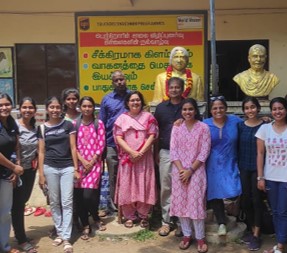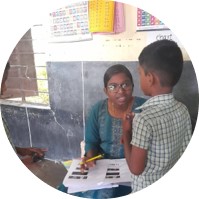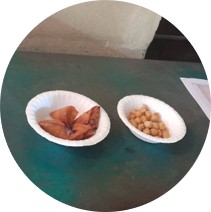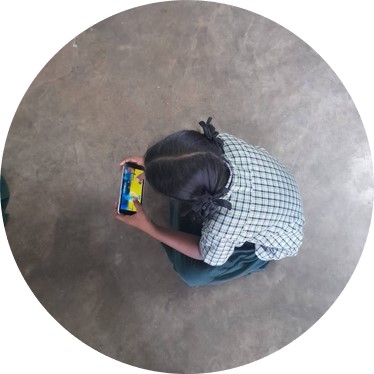DVx-SCHOOL
DVx-SCHOOL stands for Digital Vaccine for Scalable Curricular Health Outcome Optimization and Learning. The DVx-SCHOOL studies are a series of research projects which aims to merge gamification, technology, and education, through a mobile gaming application to educate and empower children in making healthier food, hygiene and lifestyle choices, while ensuring learning to be a fun experience for children.
Individual Studies
DVx-PUMS
The DVx-PUMS Study was a collaborative research project between Dr.Usha Sriram of VHS Chennai and Dr. Rema Padman, CMU with technology support from FriendsLearn, Chennai and other collaborators from India and US.
-
Objective:

The objective of the study was to assess and quantify the longitudinal impact of a mobile App-based module – FYA-003, within the clinically proven app fooya, on the dietary and physical activity habits, hygiene practices, clinical outcome measures, and related knowledge of children and their caregivers.
- Methodology:
The study used a two-arm randomized field experiment research design conducted for a period of 12 weeks. The participants were PUMS school children of the age group 5-14 years. Equal number of participants specific to each grade were randomly assigned to either the intervention group or the control group. The intervention group subjects received the FYA-003 module on weekly basis along with usual school curriculum, while subjects in the control group received non-health educational mobile games along with their school curriculum.
The children's dietary habits, physical activity habits, clinical outcome measures and related knowledge at pre-invention, during and post-intervention timelines, through child and parent surveys, food logs and school attendance reports.Further, the game telemetry data including the player actions and events were collected automatically when the mobile device was connected to the internet.
All the data were de-identified and statistical analysis and Machine learning methods were applied to quantify the impact of FYA-003 on health knowledge and learning outcomes.



- Results and Conclusion:
From the initial analysis of health hygiene knowledge, it was observed that playing a mobile health gamesignificantly improved students' knowledge of infectious disease prevention. Also, students who played the game scored an average of 0.58 points higher on a knowledge test than students who did not play the game. Further, the effects of the game were strongest in younger grades, suggesting that it may be most effective to introduce mobile health interventions to students early. There is an ongoing analysis regarding food choices and game play patterns.
DVx-SAP
The DVx-SAP study was conducted in collaboration between Dr.Padman from Heinz College of CMU, John Hopkins University, Hostfra University, Seethapathy Clinic and Hospital, Chennai, Technical Partner, FriendsLearn and other collaborators from United States and India.
-
Objective:
The objective of the study was to investigate the instantaneous impact of the digital vaccine candidate, fooya! on the food choices of children. Further, study was aimed at analyzing the game play patterns of the players to understand its effect on player's food choices.
- Methodology:
A randomized controlled trial was conducted on 104 children belonging to the age group of 10-11. The children were randomly assigned to the treatment or control group. Those assigned to treatment group were allowed to play the dietary mobile app, fooya! in two sessions each lasting 20 mins. On other hand, the subjects assigned to control group were made to play Uno, a board devoid of any dietary education. Subjects from the treatment and control group were made to select 2 out of 6 food options (3 Healthy and 3 Unhealthy options), following the end of each session. The choices made by the subjects was the primary measure of outcome. Statistical analysis of choices between the treatment and control were conducted. Further, the telemetry data was harnessed to assess the variability in play patterns. Markov chain models were built across students game players to determine the relationship between the patterns and food choices if any.
- Results and Conclusion:
The findings revealed a significant positive impact of the mobile game fooya! on the number of healthy foods chosen. Substantial variation was observed in the game play patterns exhibited by children and specifically the proportion of highly rewarded scoring activities displayed the greatest variability. It was also observed that healthy food choice was inversely associated with the number of unhealthy food facts read by children during gameplay. Our study demonstrated that a mobile video game embedded with implicit learning components had a significant positive influence on children's immediate food choices following gameplay.
DVx-BY
The DVx-BY Pilot study was conducted in YesPrep Public Schools by Bhargav, CEO of FriendsLearn in collaboration with Baylor College of Medicine.
- Objective:
The study was aimed at assessing the impact of Fooya on the snacks selection and consumption habits of middle school students.
- Methodology:
The study was conducted with 140 children from Grade 6 to 8 of YesPrep Public School. The study subjects were randomly assigned to the treatment group (HGG) or the control group (CG). While the subjects in the HGG group played Fooya and then were let to chose snacks, those in CG were made to pick snack options before playing the Fooya game. Following playtime, the students were made to complete a questionnaire assessing their perception of Fooya, Mobile Device and general video game usage. Both groups were then asked to select snacks from options including chips vs. carrots, cookies vs. apples, and soda vs. water. Snack choices were counterbalanced to mitigate order effects. Researchers recorded the snack selections and whether the snacks were consumed.
- Results and Conclusion:
After playing the Fooya game, students in the HGG group made significantly more healthy snack choices compared to those in the CG. On that note, it was concluded that playing the health video game Fooya prior to snack selection positively influenced students to make healthier snack choices. However, there were no significant differences in the consumption of healthy snacks once chosen.
DVx-SUMMER
The DVx-SUMMER study was conducted at the 2014 ExxonMobil Bernard Harris Summer Science Camp in collaboration with the technical partner, FriendsLearn.
- Objective:
The study was specifically aimed to determine whether playing fooya influenced children's food choices, with a focus on improving awareness and self-efficacy regarding healthy eating.
- Methodology:
The study involved 192 participants, including 95 males and 97 females, who completed a pre-fooya questionnaire. Of these, 139 participants, comprising 67 males and 72 females, completed a post-fooya questionnaire. Additionally, 32 campers at Temple University maintained food logs, recording their food choices and consumption for three consecutive days before and after exposure to fooya. The study design included administering the pre-fooya questionnaire at the camp's outset, exposing campers to fooya on the 9th day of the camp, and conducting the post-fooya questionnaire on the 10th day. Food logs were also maintained during this period. Data were collected through self-reporting, although some data loss and potential inaccuracies were acknowledged.
- Results and Conclusion:
Following exposure to fooya, the study observed an increase in awareness of nutrition, health, and diet among participants. The food logs of 32 campers at Temple University indicated several positive changes, including a reduction in overall calorie consumption, increased consumption of fruits, decreased consumption of sugary beverages and processed foods, and a slight increase in vegetable consumption. These improvements in dietary behavior were sustained over the 3 day data collection period.
The study found that a single exposure to fooya had a measurable impact on children's dietary choices for up to 2-3 days. This suggests that fooya may effectively promote healthy food habits in children, potentially contributing to addressing childhood obesity.